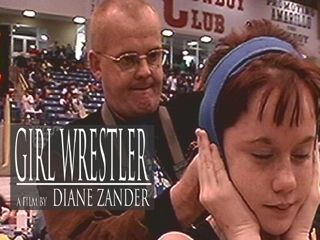Girl Wrestler
Tara is 13. She likes to go to the mall. And she likes to wrestle boys. We follow her on her journey to the national championships as she battles cultural expectations and struggles to cope with the pressure to succeed.
 Tara is 13. She likes to go to the mall. And she likes to wrestle boys. We follow her on her journey to the national championships as she battles cultural expectations and struggles to cope with the pressure to succeed. From confronting institutionalised discrimination to grappling with eating disorders, Tara's story takes a personal look at the clash of gender and sport in American culture. An intriguing look at modern girlhood. Made for PBS.
Tara is 13. She likes to go to the mall. And she likes to wrestle boys. We follow her on her journey to the national championships as she battles cultural expectations and struggles to cope with the pressure to succeed. From confronting institutionalised discrimination to grappling with eating disorders, Tara's story takes a personal look at the clash of gender and sport in American culture. An intriguing look at modern girlhood. Made for PBS.
"The girls who are doing it are pioneers," states Joan Palmer. "I know coaches who don't want girls wrestling, parents that don't want it." Even the law is against it. Next year, when Tara enters high school, it will be illegal for her to wrestle boys. But with so few other girls wrestling, her opportunities to compete will virtually disappear. She has just one more year to prove herself.
For Tara, wrestling is more than just a sport. It's her main way of bonding with her father. "I'm his son that he never had," she explains. Her parents divorced when she was three and relations between them are still strained. Now, the only time she does see her father is when he takes her to wrestling practise or tournaments. If she stops wrestling, "I won't see him, like, ever ... I think we'll grow further apart."
This year, with her body changing and competing against boys with more upper body strength, she's lost a lot of her matches. Her father - who has never wrestled himself - thinks she isn't trying hard enough. "Sometimes he pushes me a little too far ... I just want less pressure to be perfect," she confides.
As much as she resents her father's pressure, she's grateful for his encouragement. With no female role models to look up to, her idols have always been men, like the Olympic wrestler Brandon Slay. So it comes as a bitter disappointment to Tara when she finally meets him at one of her competitions, only to have Slay tell her: "I'm not a big believer in girls wrestling."
Many other sports officials share his view. They see something disturbingly sexual in girls wrestling and believe it's inappropriate. "Even at ten years old, nine years old, boys are sexually aware," states coach Kai Collins. Wrestler Joel Phillips agrees. "These are kind of explicit moves." But there's a sense that there's a deeper reason behind their objections. Tara's very presence in the arena challenges their masculinity. As Joel admits: "You lose to a girl, you walk out of the gym, you walk out of the stadium, you don't come back."
As Tara edges closer to the nationals, wrestling takes over more and more of her life. She cuts her long auburn hair to prevent opponents pulling it and she starts crash dieting. Soon she's developing signs of bulimia. "You gotta lose five pounds in one night. If you don't, you're a disgrace to your coach and your team-mates and you're not really a good wrestler," explains wrestler Joel Phillips. All her hard work pays off and she qualifies for the Nationals. But how will she fare competing against stronger boys? And what will she do next year when she enters high school?
A thought-provoking look at constructed gender boundaries.
Director: Diane Zander for PBS
FULL SYNOPSIS
